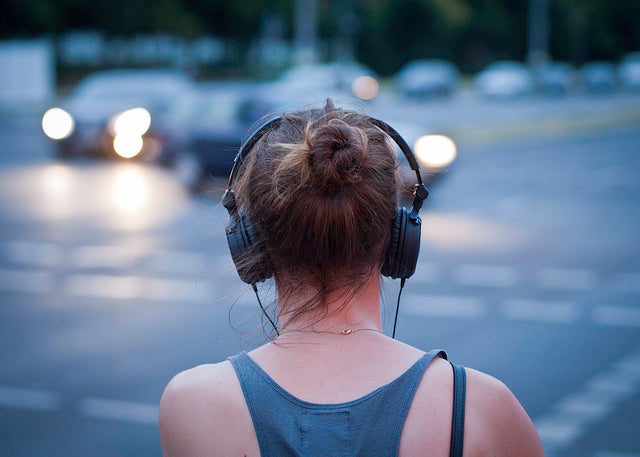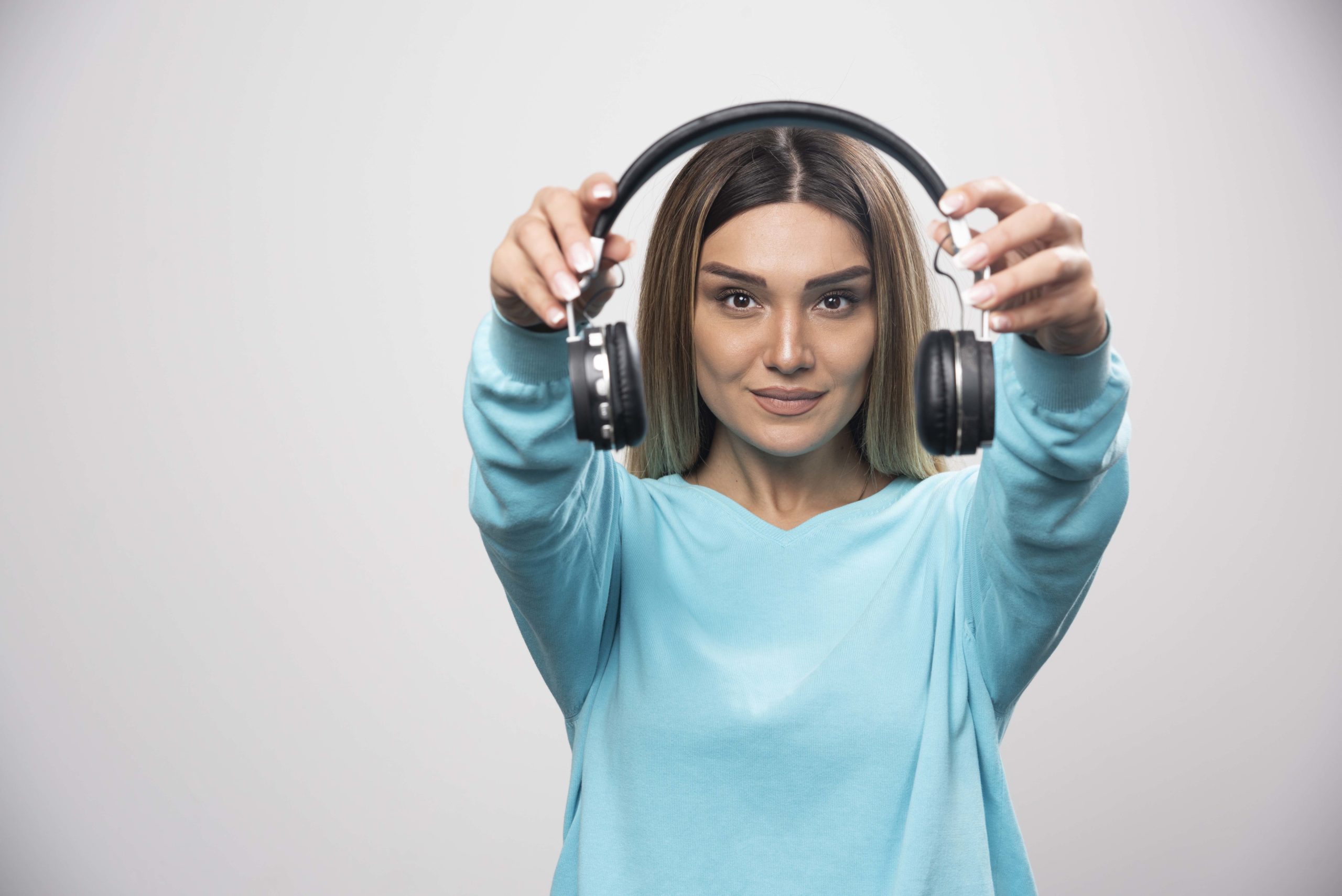Do you use headphones to listen to music every day? Do you have any children who do?
During the day, How Long Should You Wear Headphones Per Day? You may use your headphones to enjoy music and peace and quiet.

Kids, especially teenagers, do it as well. However, as a parent, you may feel more inclined to tell them to remove their headphones from time to time.
Especially if you've already asked them to take out the trash five times and they haven't even blinked an acknowledgement.
However, ignoring chores or responding to inquiries is the least of your concerns. If you don't talk to your teenagers about the dangers of hearing loss through headphones, you'll be in a lot of trouble.
You can get into trouble as well if you don't keep track of how long you're wearing your headphones or how loud the volume is on them.
The statistics for teenagers, on the other hand, are astounding. Because headphones are so common, one in every five teenagers will have some form of hearing loss. This is 30% higher than just 20 years ago, and experts attribute it to headphones.
It's not that headphones aren't useful. In fact, if used correctly, they can bring peace, allow for better musical enjoyment, and even protect your ears from higher decibels.
The issue with headphones is that most people – adults and teenagers alike – listen for far too long or far too loudly, or some combination of the two.
What concerns me the most is what this means for children. High volumes and prolonged listening sessions, according to osteopathic pediatricians, can cause permanent lifelong hearing loss in children and teenagers. This can cause a delay in speech and language development.
IS IT OKAY TO WEAR HEADPHONES ALL DAY?
The normal use of in-ear devices rarely causes a problem. However, prolonged earphone use, such as leaving them in all day, may: compress the earwax, making it less fluid and more difficult for the body to naturally expel. compact the earwax to the point where the body causes inflammation.
Alternative Video: How Should You Wear Headphones per day?
SUGGESTED POSTS:
- Do Wired Headphones Emit Radiation? (Quick Answer!)
- Are Monitor Or Studio Headphones Good For Listening To Music? Click Here
- Are Headphones Input Or Output Devices? (Answered!)
HOW TO KNOW IF YOU HAVE HEARING DAMAGE?
Hearing loss isn't always irreversible. It could only be a matter of time. The only way to be certain is to consult with your doctor.
Most people are prone to gradual hearing loss that worsens over time, but this does not usually manifest itself until they are much older. Nonetheless, by following the suggestions above, you can extend your hearing.
If you're wondering if you have hearing damage, look for the following symptoms after being exposed to loud sounds: muffling of speech or difficulty understanding certain words, difficulty following a conversation or asking the speaker to slow down their speech in noisy environments, or buzzing and ringing in the ears, also known as tinnitus.
It's even more upsetting for kids. If your children hear a ringing, roaring, hissing, or buzzing sound in their ears, they may have hearing loss.
Also, if they are unable to understand someone speaking to them in a noisy environment, hear muffled sounds or feel as if their ears are plugged up, or listen to music at higher volumes than usual, you should make an appointment with their pediatrician right away.

DOES LISTENING TO LOUD MUSIC WITH HEADPHONES CAUSE HEARING LOSS?
It is now estimated that nearly 12.5 percent of all teenagers have some degree of hearing loss as a result of exposure to high volumes from their headphones. This figure is nearly 30 percent higher than it was just 20 years ago.
According to the Centers for Disease Control and Prevention, nearly 17% of all adults aged 20 to 69 suffer from hearing loss. That equates to nearly 26 million people in the United States alone.
While other factors may be at work, it is believed that the main culprit is the manner in which teenagers and young adults listen to music. You see, modern headphones can reach volume levels of up to 120dB at max volume.
To put that in context, it's roughly the same as a car honking its horn directly into your ears. That's a lot of noise. While most people don't listen to their headphones at full volume, the risk of damage is still present.
Especially when you consider that even at 60% of 120dB, you are still at a rate of around 65-70dB. This is about the noise of a crowded room full of people talking.
Prolonged exposure to loud noises has been linked to a number of negative side effects. One of the most serious consequences is permanent hearing loss. However, there is one additional side effect that many people overlook. Tinnitus is what it is.
HOW LONG SHOULD YOU WEAR HEADPHONES PER DAY?
Is there a time limit on how long you can wear your headphones every day? There is, in fact, such a thing. According to the World Health Organization (WHO), the answer to the question of how long you should wear your headphones per day is one hour.
This may appear unreasonable to you or your teen (or even both of you), but the truth is that the longer you listen and the louder it is, the sooner you will lose your hearing.
Hearing loss used to be a problem only as people aged, but it's now much more common in younger generations due to the amount of music we listen to.
Teens and young adults are also more likely to attend concerts and clubs.
Maybe you've stopped going to clubs, but have you stopped listening to loud music?
If not, you should be aware that the WHO reports that over 1.1 billion people between the ages of 12 and 35 are at the highest risk of hearing loss.
Headphones, on the other hand, can be beneficial to your auditory health if used correctly. These are the best over-ear or noise-cancelling headphones to use because they allow you to hear what you want to hear at much lower volumes.
Most people wear headphones to drown out distracting background noises, but if you can't hear them, you're less likely to keep turning up the volume.
Headphones at maximum volume can cause hearing damage in as little as 4 minutes. Reading this as an adult is probably shocking. However, your teen may not understand why you're asking them to take off their headphones or turn down the volume.
The WHO is also encouraging headphone manufacturers and government regulatory agencies to step in and create listening devices that will not permanently harm those who use them. It isn't just headphones, either.
Loud concerts and clubs should also take precautions to protect their patrons' hearing. Offering earplugs or having quiet rooms where people could take breaks from the noise would undoubtedly help.
You can, however, take control of your hearing until that happens. Reduce the volume and remove your headphones to give your ears a break. Also, discuss it with your children. It also doesn't matter what kind of music they're listening to.

HOW TO SET THE SAFEST VOLUME FOR YOUR HEADPHONES
Hearing loss can occur after a little more than an hour of listening because most personal listening devices today can reach 120 decibels, which is equivalent to putting a rock concert in your ears. It's too loud if you can't hear anything around you, such as a loved one asking you a question just an arm's length away.
When using headphones, audiologists recommend that you keep the volume at no more than 60% of its maximum setting. You should also limit your listening time to no more than 60 minutes per day. The shorter you should listen, the louder the sound.
According to this logic, if you turn the volume all the way up, you should only listen for 5 minutes per day. That, of course, is not enjoyable. That's why so many people turn up the volume when their favorite song comes on.
However, tone re-balancing via equalizers can be used to adjust the amplitude and enjoy music at a lower volume. Changing the treble, bass, high and low frequencies can help you listen without damaging your eardrums.
HOW TO KNOW IF YOU HAVE HEARING DAMAGE

Hearing loss isn't always irreversible. It could be only temporary. The only way to be certain is to consult with your doctor. Most people are prone to gradual hearing loss that worsens over time, but this does not usually manifest itself until they are much older.
Nonetheless, by following the suggestions above, you can extend your hearing. If you're wondering if you have hearing damage, look for the following symptoms after being exposed to loud sounds: muffling of speech or difficulty understanding certain words, difficulty following a conversation or asking the speaker to slow down their speech in noisy environments, or buzzing and ringing in the ears, also known as tinnitus.
It's even more upsetting for kids. If your children hear a ringing, roaring, hissing, or buzzing sound in their ears, they may have hearing loss.
Also, if they are unable to understand someone speaking to them in a noisy environment, hear muffled sounds or feel as if their ears are plugged up, or listen to music at higher volumes than usual, you should make an appointment with their pediatrician right away.
HOW TO PREVENT DAMAGE
Although they were unable to determine how loudly or for how long the participants listened to music, it is known that those players can blast decibels at a maximum of 95 to 105.
The Dangerous Decibels campaign in Oregon discovered that using regular headphones with your listening device set to maximum volume can cause hearing damage in as little as 15 minutes.
Loud noises harm the tiny hair in the top of your hair cells, which are located in your inner ear. Noises cause them to vibrate, causing the voltage in them to change.
This, in turn, causes a chemical message to be sent from your nerves to your brain. Essentially, repeatedly pummeling these delicate hairs in this manner will harm them.
HOW TO WEAR YOUR HEADPHONES HEALTHILY?

The World Health Organization recommends that you limit your use of headphones to one hour per day. Even if you only have one hour, you should not listen to anything at full volume. The volume of what you listen to should not be higher than 60%.
Certainly, the loud sound raises the risk. While listening, you should take five to ten-minute breaks to allow for healthy listening. By adhering to these time frames, you can easily protect yourself from harm. The method described in this paragraph is also known as the rule of thumb.
In this rule, you will use your headphones for sixty minutes at a maximum volume of sixty percent. Furthermore, scientists advise against listening to anything, no matter how loud, even if you use speakers.
High volume, as mentioned in the preceding paragraph, causes more vibration and pressure in your ear canal. Before it's too late, take care of your ear health.
CONCLUSION
Headphones should never be turned up past 60% of their maximum volume, and they should not be worn for more than 60 minutes per day. This is known as the 60/60 rule, which you and your children should follow.
Using high-quality headphones, especially noise-isolating or noise-cancelling models, will allow you to enjoy your music without having to listen at dangerously loud volumes.
Purchasing a pair for each member of the household will be money well spent!
FAQs About How Long Should You Wear Headphones Per Day
Is it OK to wear headphones all day?
The normal use of in-ear devices rarely causes a problem. However, prolonged earphone use, such as leaving them in all day, may: compress the earwax, making it less fluid and more difficult for the body to naturally expel. Compact the earwax to the point where the body starts to itch.
How many hours should I wear headphone?
Noise-induced hearing loss caused by earbuds is completely avoidable if you don't use them for too long or too loudly. Doctors recommend the 60 percent/60-minute rule, which states that you should listen to music, watch a movie, or play a video game at no more than 60 percent of the maximum volume. Limit your time spent with earbuds in your ears to 60 minutes.
How long can you wear headphones for?
You should not wear headphones for extended periods of time. In any case, do not exceed 60 minutes. If you are overly reliant on your headphones, make it your responsibility to remove them every 30 minutes and to keep the volume under control. When listening to music, keep the volume low.
Recent Content
Canon PowerShot ELPH 360 Digital Camera Review: A Budget-Friendly Point-and-Shoot Option
The Canon PowerShot ELPH 360 HS is a compact and user-friendly digital camera designed for beginners and casual photographers. With its 20.2 MP CMOS sensor, 12x Optical Zoom, and 25x ZoomPlus, this...
Olympus Tough TG-6 Digital Camera Review: A Rugged Companion for Your Adventures
The Olympus Tough TG-6 is a compact, rugged camera designed for capturing stunning images and videos in challenging environments. With its impressive array of features, it is an excellent choice for...


